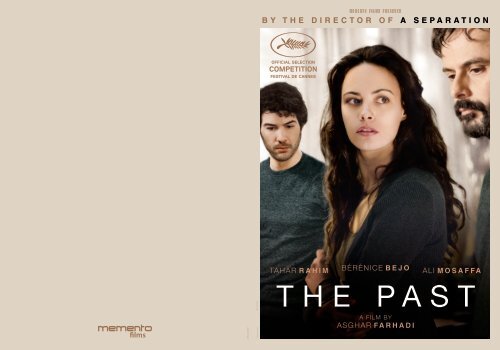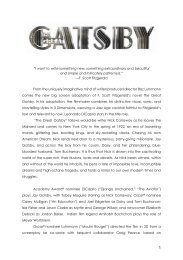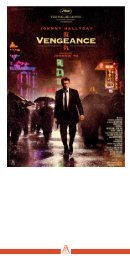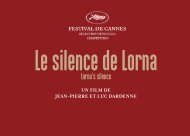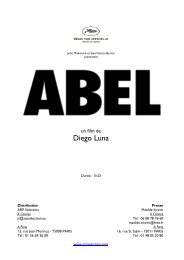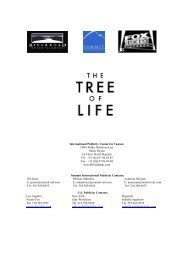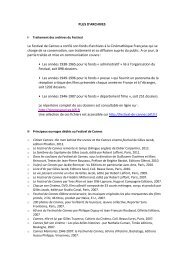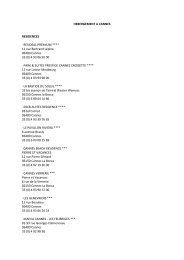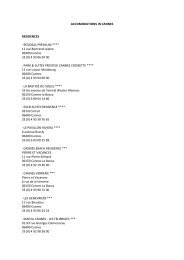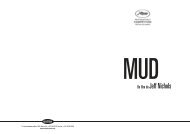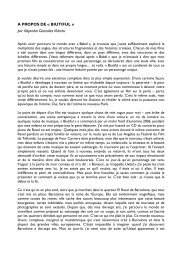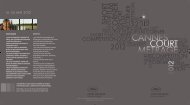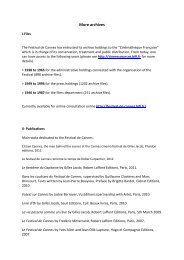in English - Cannes International Film Festival
in English - Cannes International Film Festival
in English - Cannes International Film Festival
You also want an ePaper? Increase the reach of your titles
YUMPU automatically turns print PDFs into web optimized ePapers that Google loves.
© PHOTOS : CarOle BeTHuel<br />
PHOTOS : CarOle BeTHuel<br />
M e M e n t o F i l M s P R e s e n t s<br />
B Y T H E D I R E C T O R O F a S E P a R a T I O N<br />
Tahar R a H I m bérénice B E j O<br />
ali m O S a F Fa<br />
a film by<br />
asghar Fa R H a D I
Tahar R a H I m<br />
M e M e n t o F i l M s P r o d u c t i o n<br />
Presents<br />
vanessajerrom@wanadoo.fr<br />
WORLD SALES AND FESTIVALS<br />
MEMENTO FILMS INTERNATIONAL<br />
9 cité paradis - 75010 paris<br />
tel : +33 1 53 34 90 33<br />
sales@memento-films.com<br />
festival@memento-films.com<br />
bérénice B E j O<br />
a film by<br />
asghar Fa R H a D I<br />
france, iTaly / cOlOr / 130 m<strong>in</strong> / 2013 / french<br />
PRESS IN CANNES PRESS IN CANNES<br />
FRANCE / US / UK / SWITZERLAND / BELGIUM<br />
REST OF ThE WORLD<br />
Vanessa Jerrom<br />
renDeZ-VoUs / ViViana anDrianI<br />
11 rue du marché st-honoré<br />
2 rue turgot 75009 paris<br />
75001 paris<br />
m : (+33)6 80 16 81 39<br />
m : (+33)6 14 83 88 82<br />
viviana@rv-press.com<br />
download presskit and stills : www.memento-films.com<br />
ali m O S a F Fa<br />
www.rv-press.com<br />
PRODUCER<br />
MEMENTO FILMS PRODUCTION<br />
9 cité paradis - 75010 paris<br />
tel : +33 1 53 34 90 39<br />
production@memento-films.com
s y n o p s i s<br />
Follow<strong>in</strong>g a four year separation,<br />
Ahmad returns to Paris from<br />
Tehran, upon his French wife<br />
Marie’s request, <strong>in</strong> order to f<strong>in</strong>alize<br />
their divorce procedure.<br />
Dur<strong>in</strong>g his brief stay, Ahmad<br />
discovers the conflict<strong>in</strong>g nature of<br />
Marie’s relationship with<br />
her daughter Lucie.<br />
Ahmad’s efforts to improve this<br />
relationship soon unveil a secret<br />
from their past.
INTERVIEW WITH ASGHAR FARHADI<br />
Between A SEPARATION and THE PAST, you worked on<br />
another film project. What happened?<br />
I did write another script after ABOUT ELLY, while I was<br />
stay<strong>in</strong>g <strong>in</strong> Berl<strong>in</strong>. Then I shot A SEPARATION and my<br />
French distributor, Alexandre Mallet-Guy, asked if he could<br />
read that script. He liked it and said he wanted to produce<br />
the film, either <strong>in</strong> Germany or <strong>in</strong> France. After a few trips,<br />
I chose Paris and started work<strong>in</strong>g on the project. One day,<br />
we were <strong>in</strong> a café, talk<strong>in</strong>g about it and all of a sudden, I<br />
said I had another story <strong>in</strong> m<strong>in</strong>d. It was only a synopsis but<br />
as I started tell<strong>in</strong>g the story, I realized someth<strong>in</strong>g was tak<strong>in</strong>g<br />
shape and develop<strong>in</strong>g. Another narrative was com<strong>in</strong>g<br />
to me. So we gradually shifted to this story, I developed it<br />
and quickly had a treatment ready. That’s how THE PAST<br />
was born. Be<strong>in</strong>g <strong>in</strong> Paris meant a lot. When you want to tell<br />
a story deal<strong>in</strong>g with the past, you need to set it <strong>in</strong> a city like<br />
Paris that exudes the past. This story couldn’t have taken<br />
place just anywhere.<br />
But historic Paris is not shown <strong>in</strong> the film…<br />
I was very careful not to abuse the historic aspect of the<br />
architecture of Paris and not to have a touristic approach<br />
to it. I decided at a very early stage that the ma<strong>in</strong> character’s<br />
home, <strong>in</strong> which a great part of the film takes place,<br />
would be <strong>in</strong> the suburbs and Paris would appear <strong>in</strong> the<br />
background, taken for granted. The pitfall for filmmakers<br />
work<strong>in</strong>g <strong>in</strong> an unknown sett<strong>in</strong>g is to highlight <strong>in</strong> the film<br />
the first th<strong>in</strong>gs that catch their eye. I tried to do the oppo-<br />
site. S<strong>in</strong>ce I was fasc<strong>in</strong>ated by the architecture of the city,<br />
I decided to look beyond that and reach someth<strong>in</strong>g else.<br />
What’s the writ<strong>in</strong>g process like? How do you build the<br />
story?<br />
All my stories are written <strong>in</strong> a non-l<strong>in</strong>ear way. They don’t<br />
go from po<strong>in</strong>t A to po<strong>in</strong>t B. I always have several stories<br />
develop<strong>in</strong>g simultaneously and they come together<br />
dur<strong>in</strong>g a shared situation. Here, I had the story of this<br />
man who’s been liv<strong>in</strong>g away from his wife for a few years<br />
and now is travel<strong>in</strong>g back to her to f<strong>in</strong>alize their divorce.<br />
Then, I had the story of a man with a wife <strong>in</strong> a coma who<br />
has to take care of his child. These are elements that<br />
expand separately then converge to a s<strong>in</strong>gle situation. I<br />
write <strong>in</strong>tuitively. I start with a synopsis and immediately<br />
question it, try<strong>in</strong>g to f<strong>in</strong>d out more about the little <strong>in</strong>formation<br />
that I have. S<strong>in</strong>ce I know that this man has come<br />
to get a divorce, I ask myself why he left four years ago?<br />
And now that he has returned to his wife’s house, what is<br />
go<strong>in</strong>g to happen there? So many questions emerge from<br />
these few l<strong>in</strong>es that by answer<strong>in</strong>g them the whole story<br />
is constructed.<br />
In what way did the observation of the French way of<br />
life <strong>in</strong>fluence the script?<br />
I did a lot of th<strong>in</strong>k<strong>in</strong>g about the differences. What would have<br />
been different if the story took place <strong>in</strong> Iran? In my films,<br />
the characters express themselves <strong>in</strong>directly. It’s part of my
culture but I also use it as a dramatic resource. That<br />
is less of a custom <strong>in</strong> France. Of course, it depends<br />
on the context, but generally speak<strong>in</strong>g, the French are<br />
more straightforward. So I had to adapt the development<br />
of my French characters to that new parameter,<br />
which wasn’t easy and took time <strong>in</strong> my writ<strong>in</strong>g process.<br />
Curiously, the Iranian character is the one that<br />
pushes the others to speak…<br />
He’s a k<strong>in</strong>d of a catalyst. He puts the others <strong>in</strong> a condition<br />
for speak<strong>in</strong>g, for say<strong>in</strong>g th<strong>in</strong>gs that had rema<strong>in</strong>ed<br />
unsaid for a long time. But he’s not even aware of it.<br />
One of my guidel<strong>in</strong>es was not to def<strong>in</strong>e my characters<br />
by their nationality or their flag. Their behavior is determ<strong>in</strong>ed<br />
by the situation they are experienc<strong>in</strong>g. In a crisis<br />
situation, differences tend to disappear.<br />
One of your actors says the idea of the film was<br />
triggered by your visit to a person <strong>in</strong> a coma...<br />
That’s not how th<strong>in</strong>gs happened. I went to visit patients<br />
<strong>in</strong> a coma to prepare the film. I’ve never had<br />
any personal experience with a coma, but I’ve always<br />
associated this state with a sense of uncerta<strong>in</strong>ty, an<br />
<strong>in</strong>terspace between life and death, wonder<strong>in</strong>g if the<br />
person should be considered dead or alive. Here the<br />
film is entirely built on this notion of doubt. The characters<br />
constantly have to face dilemmas, hav<strong>in</strong>g to<br />
choose between two options. In A SEPARATION too,<br />
the character had to face the common but difficult<br />
dilemma between his father’s well-be<strong>in</strong>g and his<br />
daughter’s. In THE PAST, the question is slightly different:<br />
should one be faithful to the past or give it up and<br />
move on to the future?<br />
Does the complexity of today’s life <strong>in</strong>crease these<br />
dilemmas?<br />
Probably. One tends to consider the future blurred because<br />
it’s unknown. But I th<strong>in</strong>k the past is even more unclear and<br />
opaque. It should feel clearer and closer to us now, as we<br />
keep traces from it. But photos and emails don’t help our<br />
past get any clearer. Nowadays, life may tend to move<br />
on, neglect<strong>in</strong>g the past. But its shadow weighs on us and<br />
holds us back. It seems to be as true <strong>in</strong> Europe as it is <strong>in</strong><br />
the rest of the world, that no matter how determ<strong>in</strong>ed you<br />
are to embrace the future, the weight of the past is still<br />
heavy on our m<strong>in</strong>ds.<br />
How did you choose Bérénice Béjo ?<br />
I first met her dur<strong>in</strong>g a trip to the US, where she was promot<strong>in</strong>g<br />
THE ARTIST. I immediately found her warm and genu<strong>in</strong>e.<br />
One of those people you feel you can connect to. Her performance<br />
<strong>in</strong> THE ARTIST confirmed for me that she was also<br />
an <strong>in</strong>telligent actress. These two personality traits must be<br />
present <strong>in</strong> an actor for me to choose them: be<strong>in</strong>g smart and<br />
exud<strong>in</strong>g a positive energy on the screen, someone appeal<strong>in</strong>g<br />
with whom the viewers enjoy spend<strong>in</strong>g time.<br />
She said that you were look<strong>in</strong>g for someth<strong>in</strong>g <strong>in</strong><br />
her face on the first day of the rehearsals. What<br />
was that?<br />
Doubt, which is central to Marie’s character. Bérénice<br />
herself doesn’t doubt very much. But at an early stage<br />
of the rehearsals, she proved that she was able to perform<br />
doubt.<br />
Marie’s character is the one that provokes situations,<br />
that makes th<strong>in</strong>gs move forward…<br />
She is the one who is the most determ<strong>in</strong>ed to move on<br />
and not to be stuck <strong>in</strong> the past. But who knows if she’ll<br />
be able to do it? Men are more burdened by the past. In<br />
the last scene with Marie, she walks towards us, towards<br />
the camera. Ahmad is beh<strong>in</strong>d her and she says: "I don’t<br />
want to look back anymore." And then she turns her back<br />
to the camera, and to us the viewers. She also leaves us<br />
beh<strong>in</strong>d. To that extent, she can be considered as the most<br />
progressive character. Who knows why <strong>in</strong> all my films,<br />
women have these k<strong>in</strong>d of roles. Like <strong>in</strong> A SEPARATION.<br />
What are Tahar Rahim’s qualities?<br />
I saw A PROPHET <strong>in</strong> Iran and I immediately knew that he<br />
was an exceptional actor with a wide range of perform<strong>in</strong>g<br />
skills that allowed him to take on very complex roles. I<br />
decided to work with him. One of his particular traits that<br />
I really appreciated dur<strong>in</strong>g our collaboration was how<br />
connected he is with his childhood. The emotions and the<br />
reactions related to childhood are still vivid <strong>in</strong> him.<br />
How did you choose Ali Mosaffa?<br />
He has someth<strong>in</strong>g specific as an actor and no doubt also<br />
as a man: someth<strong>in</strong>g self-reta<strong>in</strong>ed appears on his face, <strong>in</strong><br />
his way of be<strong>in</strong>g. He gives the impression of be<strong>in</strong>g a man<br />
who has a rich <strong>in</strong>ner life that he exposes very little. He is<br />
the k<strong>in</strong>d of person who draws others to him. We want to<br />
know more about him. This trait was woven <strong>in</strong>to the character<br />
because Ali was chosen. In reality, we had to f<strong>in</strong>d a<br />
professional Iranian actor who could speak French, which<br />
limited our options. Once we chose him, I wasn’t quite<br />
sure if a few weeks of preparation would be enough for<br />
him to actually master the language. But everyone who<br />
witnessed his progress <strong>in</strong> French between his arrival <strong>in</strong><br />
Paris and the first day of shoot<strong>in</strong>g was very impressed.<br />
In one of the versions of the script, Ahmad had<br />
someth<strong>in</strong>g to do with c<strong>in</strong>ema, as if he was also<br />
the one who’d write the other characters’ l<strong>in</strong>es…<br />
In one of the earlier versions of the script, I imag<strong>in</strong>ed his job<br />
may be related to c<strong>in</strong>ema but then I realized I didn’t want<br />
him to have a specific job. I wanted noth<strong>in</strong>g specific to be<br />
known about him. We had to feel curious about him, wish<strong>in</strong>g<br />
to f<strong>in</strong>d out more. But he’s not given the opportunity to deliver<br />
more <strong>in</strong>formation about himself. Even when he attempts to<br />
justify his return to Iran, his partner <strong>in</strong> the scene doesn’t let<br />
him do so. He may be a filmmaker, a documentary maker, a<br />
photographer… not know<strong>in</strong>g leaves all these options open.<br />
I th<strong>in</strong>k he has a job which you cannot do well away from<br />
home. This is one of the reasons why he left France.<br />
Is he more <strong>in</strong>tellectual than Samir?<br />
He’s a man who needs to be active. One of those people<br />
who arrive <strong>in</strong> a place and cannot help fix<strong>in</strong>g th<strong>in</strong>gs: either<br />
the bike or the s<strong>in</strong>k, or a d<strong>in</strong>ner… They feel uncomfortable<br />
when out of their habitual context because be<strong>in</strong>g<br />
elsewhere means be<strong>in</strong>g <strong>in</strong>active. For Ahmad, stand<strong>in</strong>g still
is pa<strong>in</strong>ful. We then understand why he suffered from<br />
depression when he was forced to undergo this period<br />
of passivity.<br />
How did you direct Paul<strong>in</strong>e, whose role is one of<br />
the pivots of the narrative?<br />
I met many girls of her age before choos<strong>in</strong>g Paul<strong>in</strong>e.<br />
I saw a test that had been shot with her. I immediately<br />
knew that she would br<strong>in</strong>g the right strength to<br />
the role. The key of her performance was her motivation.<br />
Lucie is secretive and reserved, like Ahmad.<br />
Be<strong>in</strong>g both <strong>in</strong>troverted gives them a certa<strong>in</strong> closeness.<br />
Paul<strong>in</strong>e herself has someth<strong>in</strong>g mysterious <strong>in</strong> the eyes.<br />
In the script, Lucie is not Ahmad’s daughter but I did<br />
want them to give an impression of be<strong>in</strong>g related, as<br />
a child with her father. Some k<strong>in</strong>d of complicity. She’s<br />
the one who’s been miss<strong>in</strong>g Ahmad the most s<strong>in</strong>ce he<br />
left. She has not only lost her mother’s husband, she’s<br />
also lost a father.<br />
Truffaut said children can’t lie <strong>in</strong> film and they give<br />
a different truth from adult actors. Do you share<br />
this feel<strong>in</strong>g?<br />
I have come to the conclusion that I’m not able to<br />
make a film without a child <strong>in</strong> it. It is difficult to work<br />
with children, though. But I f<strong>in</strong>d their presence opens<br />
the atmosphere of the film to affects and emotions<br />
which br<strong>in</strong>g a level of s<strong>in</strong>cerity to it. In my films, children<br />
do not lie, unless they are under the pressure of<br />
adults.<br />
Are children both witnesses and victims of the<br />
adults <strong>in</strong> the film?<br />
One child that nobody sees is the one Marie is<br />
carry<strong>in</strong>g. Even before be<strong>in</strong>g born, his or her dest<strong>in</strong>y is<br />
already decided by the others. I wonder what this child<br />
will be told later about his or her past and about what<br />
happened before the birth.<br />
What are the differences between shoot<strong>in</strong>g <strong>in</strong> Iran<br />
and <strong>in</strong> France?<br />
It wasn’t really different for me. I worked <strong>in</strong> the same<br />
fashion <strong>in</strong> both countries. Here there are more means<br />
and c<strong>in</strong>ema is more of an <strong>in</strong>dustry. In Iran, c<strong>in</strong>ema is<br />
a convergence of <strong>in</strong>dividual creativity, whereas here<br />
creativity is more collective.<br />
The camera was handheld <strong>in</strong> A SEPARATION and<br />
<strong>in</strong> this film it is more often still. Why this style<br />
change?<br />
Once the story took shape and I went to see the lo-<br />
cations, I realized this story had to be more steady,<br />
with a camera that would move less, that wouldn’t<br />
communicate a feel<strong>in</strong>g of restlessness. In A SEPARA-<br />
TION, all the important events took place <strong>in</strong> the here<br />
and now, <strong>in</strong> front of the viewer’s eyes. Here the key<br />
events have taken place <strong>in</strong> the past and we can only<br />
witness their <strong>in</strong>ner consequences on the characters.<br />
The film is more <strong>in</strong>teriorized and therefore more still.<br />
Are you a moralist?<br />
I don’t see myself as a moralist. But I can’t deny that<br />
moral is at stake <strong>in</strong> this film. You can also choose<br />
a sociological or psychological approach of the film.<br />
But it’s obvious that many situations can be seen under<br />
the moral angle.
ASGHAR FARHADI director and writer <strong>in</strong> Nantes. This was Asghar Farhadi’s first film to be<br />
released theatrically <strong>in</strong> France, a country that would<br />
Asghar Farhadi was born <strong>in</strong> 1972 <strong>in</strong> Isfahan (Iran).<br />
From a young age, he discovered with<strong>in</strong> himself an<br />
artistic sensibility that led him to study writ<strong>in</strong>g and to<br />
immerse himself <strong>in</strong> the world of theatre and c<strong>in</strong>ema.<br />
After enter<strong>in</strong>g the Youth C<strong>in</strong>ema Society, he cont<strong>in</strong>ued<br />
his studies at the University of Tehran, from which he<br />
graduated <strong>in</strong> 1998 with a Masters <strong>in</strong> Stage Direction.<br />
His output from his ten years of study was prodigious:<br />
he directed six short films and wrote and directed two<br />
series for television.<br />
In 2001, the doors of c<strong>in</strong>ema opened up thanks to<br />
Ebrahim Hatamikia, with whom Asghar Farhadi co-wrote<br />
the script of LOW HEIGHTS (ERTEFAE PAST) (2002), a<br />
chronicle of Southwest Iran that met with critical and<br />
commercial success. Soon afterwards, he wrote and<br />
directed his first feature film, DANCING IN THE DUST<br />
(RAGHSS DAR GHOBAR) (2003), about a man forced to<br />
divorce his wife and to hunt snakes <strong>in</strong> the desert to repay<br />
his debts to his <strong>in</strong>-laws. The film won awards at the Fajr<br />
and Moscow <strong>International</strong> <strong>Film</strong> <strong>Festival</strong>s.<br />
A year later, BEAUTIFUL CITY (SHAH-RE ZIBA) (2004)<br />
had similar <strong>in</strong>ternational success. The film, which<br />
exam<strong>in</strong>ed the pitfalls of the Iranian judicial system<br />
through the story of a young man sentenced to death,<br />
won awards at the Fajr and Warsaw <strong>International</strong> <strong>Film</strong><br />
<strong>Festival</strong>s.<br />
In his third film, FIREWORKS WEDNESDAY (CHAHAR<br />
SHANBE SOURI) (2006), Asghar Farhadi followed the<br />
trials and tribulations of a couple through the eyes of<br />
their maid. The film demonstrated the s<strong>in</strong>gularity of<br />
Asghar Farhadi’s vision. It was highly praised <strong>in</strong> Iran<br />
as well as <strong>in</strong>ternationally, where it won the awards<br />
for Best <strong>Film</strong> at the Chicago <strong>International</strong> <strong>Film</strong> <strong>Festival</strong><br />
and Best Screenplay at the <strong>Festival</strong> des 3 Cont<strong>in</strong>ents<br />
become <strong>in</strong>creas<strong>in</strong>gly receptive to his work.<br />
A prolific director and scriptwriter, Asghar Farhadi<br />
began to surround himself with a family of actors.<br />
Taraneh Alidoosti played the title role <strong>in</strong> his next film,<br />
ABOUT ELLY (DARBAREYE ELLY) (2009), which marked<br />
the third time that they had worked together. With its<br />
psychological suspense, the film seduced the critics<br />
and audiences of Iran. The film represented Asghar<br />
Farhadi’s greatest <strong>in</strong>ternational success to date: he<br />
won the Silver Bear for Best Director at the Berl<strong>in</strong> <strong>Film</strong><br />
<strong>Festival</strong> and the film won Best <strong>Film</strong> at the Tribeca <strong>Film</strong><br />
<strong>Festival</strong>. In France, led by an enthusiastic press, the<br />
film had over 100,000 admissions. It was also Iran’s<br />
official submission for Best Foreign Language <strong>Film</strong> for<br />
the Academy Awards <strong>in</strong> 2009.<br />
With A SEPARATION (JODAEIYE NADER AZ SIMIN)<br />
(2011), Asghar Farhadi reunited with a number of the<br />
actors from ABOUT ELLY, <strong>in</strong>clud<strong>in</strong>g Peyman Moadi<br />
(<strong>in</strong> the role of Nader), Shahab Hosse<strong>in</strong>i (<strong>in</strong> the role of<br />
Hodjat), and Merila Zarei, who plays Madam Ghahraei,<br />
the teacher of the young Termeh, who is played by<br />
none other than the director’s daughter, Sar<strong>in</strong>a<br />
Farhadi. After w<strong>in</strong>n<strong>in</strong>g the most prestigious awards at<br />
the Fajr <strong>Festival</strong>, A SEPARATION swept the awards at<br />
the 2011 Berl<strong>in</strong> <strong>Film</strong> <strong>Festival</strong>, where it won the Golden<br />
Bear for Best <strong>Film</strong>, the Silver Bear for Best Actress<br />
for the ensemble of actresses, the Silver Bear for<br />
Best Actor for the ensemble of actors, as well as the<br />
Ecumenical Jury Prize and the Morgen Post Reader’s<br />
Award. This was only the beg<strong>in</strong>n<strong>in</strong>g of a long list of<br />
prizes. The film took over 70 awards <strong>in</strong>ternationally,<br />
<strong>in</strong>clud<strong>in</strong>g the Golden Globe for Best Foreign Language<br />
<strong>Film</strong>, the César for Best Foreign <strong>Film</strong>, and f<strong>in</strong>ally, the<br />
Academy Award for Best Foreign Language <strong>Film</strong>. A<br />
SEPARATION sold worldwide and was an <strong>in</strong>ternational<br />
smash success, unprecedented for any Iranian film.<br />
In France, the film had one million admissions, a<br />
historic result. In the United States, where the film<br />
was released <strong>in</strong> December 2011, the film’s box office<br />
was on par with the most successful foreign language<br />
films ever released <strong>in</strong> the US.<br />
With THE PAST (2013), Asghar Farhadi shot the film <strong>in</strong><br />
France and <strong>in</strong> the French language. The film stars amongst<br />
others Bérénice Bejo, Tahar Rahim and Ali Mosaffa. The<br />
film’s screenplay won the EU Media Prize. THE PAST will<br />
premiere <strong>in</strong> competition at the 2013 <strong>Cannes</strong> <strong>Film</strong> <strong>Festival</strong>.<br />
2013 THE PAST<br />
2011 A SEPARATION<br />
2009 ABOUT ELLY<br />
2006 FIREWORKS WEDNESDAY<br />
2004 BEAUTIFUL CITY<br />
2003 DANCING IN THE DUST
INTERVIEW WITH BéRéNICE BEJO<br />
What was your first impression when you read<br />
the script of THE PAST?<br />
I had to wait a month before I received it. I’d met Asghar,<br />
then I went abroad on vacation and I waited to f<strong>in</strong>d out if<br />
he was go<strong>in</strong>g to give me the script, and if he was go<strong>in</strong>g<br />
to offer me the role or not. When I f<strong>in</strong>ally got hold of it, I<br />
picked it up like a jewel, a rare object that I was lucky to<br />
have <strong>in</strong> my hands. I found everyth<strong>in</strong>g <strong>in</strong> it that I liked <strong>in</strong> his<br />
previous films. A mood, characters who aren’t just monochrome,<br />
and who always reta<strong>in</strong> a degree of mystery, and<br />
a complex story which cont<strong>in</strong>ually makes the spectator<br />
change his or her m<strong>in</strong>d. I f<strong>in</strong>ished read<strong>in</strong>g it enchanted.<br />
How did your first meet<strong>in</strong>g go?<br />
We met two hours before I took a flight, and I’ve<br />
never done a test like that! Asghar was look<strong>in</strong>g for<br />
someth<strong>in</strong>g <strong>in</strong> my face, I didn’t know what. Then he<br />
put some cotton wool <strong>in</strong> my mouth, he darkened by<br />
forehead, he worked on the corners of my mouth.<br />
To the po<strong>in</strong>t where I said to the make-up artist: "If<br />
he wants to change my face that much, he might as<br />
well f<strong>in</strong>d someone else."<br />
We hardly spoke on the day of the tests. Just a little about<br />
the character. And when I left, I knew next to noth<strong>in</strong>g.<br />
When he spoke about the character, what did he say?<br />
"She’s a woman with two children, who is <strong>in</strong> love with a<br />
man who has a child, and who has to get divorced from<br />
another man." He asked me if I had any children. I told<br />
him I have two, and that my partner also has two. So I’m<br />
mother to four children, every other week. It was a way<br />
of tell<strong>in</strong>g him: "I can relate to what you are tell<strong>in</strong>g me,<br />
and perhaps I can f<strong>in</strong>d an echo of it <strong>in</strong> my life so that it<br />
works on screen."<br />
Asghar Farhadi is very keen on organiz<strong>in</strong>g rehearsals<br />
before his shoots. How long did they last?<br />
Two months. We met up three or four times a week,<br />
sometimes also on a Saturday, and we rehearsed for<br />
four to five hours. It’s someth<strong>in</strong>g I’d never done before,<br />
and must be close to the preparation for a stage actor,<br />
work<strong>in</strong>g as a troupe. Asghar had us do exercises for<br />
half-an-hour; we walked round the room, we ran, we<br />
relaxed, we did sit-ups. And he always demonstrated<br />
the exercises to us, clearly tak<strong>in</strong>g the role of troupe<br />
leader. After that, we read the script, and sometimes we<br />
improvised a little around it. And we always all did the<br />
same, even when the scene didn’t <strong>in</strong>volve us.<br />
By the end, I was grow<strong>in</strong>g more and more impatient. I<br />
wanted to get on with film<strong>in</strong>g, especially s<strong>in</strong>ce Asghar’s<br />
demands were becom<strong>in</strong>g <strong>in</strong>creas<strong>in</strong>gly precise.<br />
Did this precision scare you ahead of the shoot?<br />
I was ma<strong>in</strong>ly afraid of grow<strong>in</strong>g tired of the text and the<br />
story. And once we started shoot<strong>in</strong>g, I felt I’d already<br />
done the film! In movies, the first montage that the<br />
editor puts together right after the shoot is called the<br />
"rough cut". I felt as if I had done this rough cut myself!<br />
When you’re an actor, you sometimes worry about<br />
lack<strong>in</strong>g <strong>in</strong> spontaneity, but I discovered that it is through<br />
work<strong>in</strong>g that one becomes more spontaneous. You<br />
know the character so well that th<strong>in</strong>gs escape from you.<br />
So <strong>in</strong> the end, how did the shoot go?<br />
Asghar made it easy. I was never struggl<strong>in</strong>g, I always<br />
played Marie quite naturally because I knew her by heart.<br />
I’m not say<strong>in</strong>g there were no moments of doubt, times<br />
when we redid takes, when we were all grop<strong>in</strong>g around<br />
for someth<strong>in</strong>g, but I experienced all the <strong>in</strong>cidents <strong>in</strong> her<br />
life from the <strong>in</strong>side. Sometimes <strong>in</strong> the even<strong>in</strong>g, I’d say:<br />
"I don’t understand. I feel as if it all came so naturally."<br />
That was exactly what Asghar was after: for me never to<br />
<strong>in</strong>tellectualize the character, for me to always live it from<br />
the <strong>in</strong>side.<br />
Are you at all like Marie?<br />
Not at all. That’s an <strong>in</strong>terest<strong>in</strong>g po<strong>in</strong>t: I was shoot<strong>in</strong>g<br />
scenes <strong>in</strong> which Asghar asked one th<strong>in</strong>g or another from<br />
me, and I would th<strong>in</strong>k: "That’s so not me!" At no time<br />
would I have reacted the way Marie reacts. What a delight<br />
for an actor to play a character so easily who is the<br />
complete opposite of themselves.<br />
What did you know about Marie at the start of<br />
rehearsals? Had you constructed a back-story<br />
for her character?<br />
I knew she was a pharmacist <strong>in</strong> Paris, whilst liv<strong>in</strong>g on the<br />
outskirts. It’s not really very clear, but I imag<strong>in</strong>ed she was a<br />
simple employee at the pharmacy. Dur<strong>in</strong>g rehearsals, we<br />
thought about her relationship with Ahmad, how they had<br />
met, and also who was her first husband with whom she<br />
had two children. And also why Ahmad and Marie split up.<br />
We even acted out some break-up scenes. We imag<strong>in</strong>ed<br />
that they separated via Skype. Ahmad left, say<strong>in</strong>g he’d be<br />
back, but he never did come back. It was important for me<br />
to act out those scenes: it forged someth<strong>in</strong>g between Ali,<br />
who plays Ahmad, and me. I could look him <strong>in</strong> the eyes,<br />
laugh with him, cry – he was part of my everyday life.<br />
We also constructed the past of the character played by<br />
Tahar. For example, we did quite an <strong>in</strong>terest<strong>in</strong>g exercise<br />
<strong>in</strong> which Asghar asked us, fac<strong>in</strong>g the camera, to say who<br />
Samir’s wife was. I described her physically. Then Tahar<br />
did the same th<strong>in</strong>g. And gradually a picture of this woman<br />
emerged...<br />
The script stipulates that there was a complicated episode,<br />
that Ahmad was depressive for a long time. Did<br />
you discuss this period and imag<strong>in</strong>e these moments?<br />
No. Asghar often talks about immigrants. He often<br />
says that Iranian culture is very different to ours, and<br />
that often those Iranians who come to France cannot<br />
adapt to our lifestyle. They get depressed and return<br />
home. I th<strong>in</strong>k Ahmad’s character is a little like that.<br />
He’s someone who tries to <strong>in</strong>tegrate <strong>in</strong>to a new society,<br />
<strong>in</strong>to a new life, and who genu<strong>in</strong>ely falls <strong>in</strong> love.<br />
But at some po<strong>in</strong>t, it’s too much for him and he’d rather<br />
go home. Marie has understood what happened<br />
to Ahmad. If she’s angry with him, it’s because he didn’t<br />
have the courage to tell her to her face. You can tell <strong>in</strong> his<br />
films that Asghar believes <strong>in</strong> women more than <strong>in</strong> men;<br />
that he f<strong>in</strong>ds women stronger and more expressive<br />
The story is universal, but does it say anyth<strong>in</strong>g about<br />
today’s France?<br />
No, not particularly. It has someth<strong>in</strong>g to say about<br />
today’s world. About the complicated relationships<br />
between human be<strong>in</strong>gs, about the situations <strong>in</strong> which<br />
they may f<strong>in</strong>d themselves, which are sometimes completely<br />
absurd. In fact, Asghar likes pos<strong>in</strong>g questions,<br />
putt<strong>in</strong>g people <strong>in</strong> certa<strong>in</strong> situations, but don’t count on<br />
him to supply any answers or solutions. That’s what<br />
works <strong>in</strong> his filmmak<strong>in</strong>g.
Your character <strong>in</strong> some ways serves the role of provok<strong>in</strong>g<br />
emotions, while the mascul<strong>in</strong>e characters are<br />
more evasive, or cowardly.<br />
It’s true, Marie is always at the heart of the action. She’s<br />
the one who asks the difficult questions, and who is<br />
wait<strong>in</strong>g for the answers. But as an actress, I didn’t really<br />
feel that, because Asghar’s way of shoot<strong>in</strong>g is very particular,<br />
very meticulous. The shoot was very long. Sometimes<br />
we did five shots a day, when on another film,<br />
you might do 15. Everyth<strong>in</strong>g is at once diluted and very<br />
precise.<br />
How do you grasp the character when you work fragment<br />
by fragment?<br />
That’s what the rehearsals were for. Then there’s the total<br />
confidence I have <strong>in</strong> Asghar. He can be really very, very<br />
precise. Certa<strong>in</strong> scenes are put together like a ballet. For<br />
example, he would say: "Now Bérénice, you do this, you<br />
go there, at this po<strong>in</strong>t you speak, you move <strong>in</strong> that direction.<br />
And you, Tahar, once she speaks, you move this<br />
way." And he would perform all my movements, then<br />
those of Tahar, then say our dialogue but without act<strong>in</strong>g.<br />
To beg<strong>in</strong> with, this can be quite unsettl<strong>in</strong>g. You wonder<br />
how you can put your own stamp on it. But <strong>in</strong> fact, it<br />
doesn’t always happen as he demonstrated it; he just <strong>in</strong>dicates<br />
a path. It’s his way of help<strong>in</strong>g us, of say<strong>in</strong>g: "Here,<br />
I’ll give you a pathway so that you feel loved, aided, watched<br />
over, but from then on, do what you like." And I love<br />
that. He’s a manipulator, but with no perversity.<br />
Asghar Farhadi doesn’t speak French. What did that<br />
change on set?<br />
Dur<strong>in</strong>g the two months of preparation, we really had<br />
time to get used to the person who was translat<strong>in</strong>g,<br />
Arash. He did an extraord<strong>in</strong>ary job, translat<strong>in</strong>g everyth<strong>in</strong>g.<br />
When Asghar said to us: "I’d like you to go to<br />
the left, er no, sorry, I’d like you to go the right," Arash<br />
repeated all that word for word. He became Asghar’s<br />
voice. To beg<strong>in</strong> with it was quite disconcert<strong>in</strong>g, but as<br />
th<strong>in</strong>gs went along, I didn’t even th<strong>in</strong>k about Asghar not<br />
speak<strong>in</strong>g French. Anyway, Asghar is so expressive, he<br />
makes so many gestures, I don’t even need Arash to<br />
translate. I already know where he’s go<strong>in</strong>g.<br />
Born <strong>in</strong> Argent<strong>in</strong>a, Bérénice Bejo arrived <strong>in</strong> France at<br />
the age of 3. Immersed rapidly <strong>in</strong> the c<strong>in</strong>ema world by<br />
her father, the director Miguel Bejo, she started her<br />
career <strong>in</strong> 1998 <strong>in</strong> LES SOEURS HAMLET by Abdelkrim<br />
Bahlo. Gérard Jugnot offered her her first lead role<br />
<strong>in</strong> MOST PROMISING YOUNG ACTRESS <strong>in</strong> 2000. She<br />
then shot briefly <strong>in</strong> the US <strong>in</strong> A KNIGHT’S TALE with<br />
Heath Ledger, and then back <strong>in</strong> France with directors<br />
like Laurent Bouhnik, Steve Suissa and Marie-France<br />
Pisier. In 2006, she co-stared with Jean Dujard<strong>in</strong> <strong>in</strong><br />
OSS 117 : CAIRO, NEST OF SPIES, directed by Michel<br />
Hazanavicius.<br />
With Peppy Miller’s part <strong>in</strong> THE ARTIST, written<br />
and directed by Michel Hazanavicius, she reached<br />
<strong>in</strong>ternational recognition. For this role she received<br />
a Cesar Award for Best Actress and nom<strong>in</strong>ations<br />
all around the world, <strong>in</strong>clud<strong>in</strong>g Best Actress at the<br />
BAFTAS and Best Actress <strong>in</strong> a support<strong>in</strong>g role at the<br />
Golden Globes and at the Academy Awards.<br />
She has just f<strong>in</strong>ished shoot<strong>in</strong>g Eric Barbier’s new film<br />
LE DERNIER DIAMANT, <strong>in</strong> which she co-stars with<br />
Yvan Attal.<br />
BéRéNICE BEJO<br />
2013 THE PAST by Asghar Farhadi<br />
THE SCAPEGOAT by Nicolas Bary<br />
2012 POPULAIRE by Régis Ro<strong>in</strong>sard<br />
2011 THE ARTIST by Michel Hazavanicius<br />
2008 MODERN LOVE by Stéphane Kazandjian<br />
2006 OSS 117 : CAIRO NEST OF SPIES<br />
by Michel Hazavanicius<br />
2003 24 HOURS IN A LIFE OF A WOMAN<br />
by Laurent Bouhnik<br />
2001 A KNIGHT’S TALE by Brian Helgeland<br />
2000 MOST PROMISING YOUNG ACTRESS<br />
by Gérard Jugnot
INTERVIEW WITH TAHAR RAHIM<br />
Initially, you were due to make another film with<br />
Asghar Farhadi. What was that, and what happened?<br />
Asghar had seen A PROPHET, and he told me that was<br />
why he wanted to work with me. We met up and he told<br />
me about this project. It seems quite a while ago now,<br />
but I remember there was a man and a woman who fell<br />
<strong>in</strong> love over the <strong>in</strong>ternet. The writ<strong>in</strong>g came up aga<strong>in</strong>st a<br />
specific problem: the use of a webcam. Anyway, we were<br />
supposed to see each other three weeks later, and dur<strong>in</strong>g<br />
this meet<strong>in</strong>g he told me the plot of THE PAST. I asked<br />
about the other film. He replied that he’d rather make this<br />
one, because it was more personal for him. It came as a<br />
surprise, but s<strong>in</strong>ce we hadn’t yet started work<strong>in</strong>g …<br />
Why did he choose you?<br />
I don’t know exactly. But I th<strong>in</strong>k Asghar chooses actors for<br />
their “model<strong>in</strong>g clay” potential. I th<strong>in</strong>k he likes to transform<br />
people. He’s not <strong>in</strong>terested <strong>in</strong> tak<strong>in</strong>g an actor and just ask<strong>in</strong>g<br />
him to do what he’s done before, and he’s right. What’s<br />
more, he wanted to wash me clean of all my previous roles.<br />
He had seen all my films and it was obsessive. It went right<br />
down to the detail of the costumes. Sometimes I would<br />
wear a jacket a bit like one I’d worn <strong>in</strong> another film, and<br />
he’d say, “No, I’ve seen that before, I don’t want that.”<br />
Did Asghar talk to you about your orig<strong>in</strong>s?<br />
We touched on the subject, and we agreed: the film<br />
shouldn’t be about that. The film is like what society<br />
is like today <strong>in</strong> France – how we go through it with<br />
our highs and our lows, but with no question of cultural<br />
heritage, of be<strong>in</strong>g a couple from an immigrant<br />
background, and so on. Asghar understood that the<br />
country has moved beyond that.<br />
How would you describe the character of Samir?<br />
As a man who’s tired of life. He is hung-up on his guilt,<br />
caught between a love which still lasts and a new love<br />
– between a past life and the desire to move on to a fu-<br />
ture life. And I th<strong>in</strong>k he’s a guy who really is constantly<br />
depressed, but who keeps it all <strong>in</strong>side. He hangs on,<br />
and that’s a sign of his maturity. He’s a bit older than<br />
me – <strong>in</strong> his thirties – and he’s taken a few knocks <strong>in</strong><br />
life. No doubt this has aged him more quickly. Asghar<br />
transformed me, mak<strong>in</strong>g my hair a little gray. I adopted<br />
a slightly heavy gait, and slower movements, whereas<br />
normally I’m much fleeter of foot.<br />
Did you see the character like that right away?<br />
To beg<strong>in</strong> with, I imag<strong>in</strong>ed him more smiley, more <strong>in</strong>to<br />
the spontaneity of the good th<strong>in</strong>gs <strong>in</strong> life. But Asghar<br />
saw him differently. We talked about it a lot. For him, it<br />
was a character very like the father <strong>in</strong> BICYCLE THIEF.<br />
Asghar asked me to watch De Sica’s film. He wanted<br />
me to understand the almost adult relationship that<br />
a father can have with a child. My nature and my<br />
own upbr<strong>in</strong>g<strong>in</strong>g made me gravitate towards someone<br />
more upbeat, but <strong>in</strong> the end, Asghar was right.<br />
Was the long rehearsal process someth<strong>in</strong>g new for<br />
you?<br />
I rehearsed a lot for the Jacques Audiard film. But it<br />
was a different k<strong>in</strong>d of rehearsal; it was about f<strong>in</strong>d<strong>in</strong>g<br />
the character, construct<strong>in</strong>g him. With Asghar, it was<br />
about do<strong>in</strong>g it his way. He wanted to make his actors<br />
malleable so they could fit with the directions he<br />
gives.<br />
What did the rehearsals br<strong>in</strong>g to you?<br />
They helped me understand my character better, and<br />
helped me adapt to how the shoot was go<strong>in</strong>g to be<br />
us<strong>in</strong>g Asghar’s method. They also allowed me to probe<br />
a bit more around the important issues <strong>in</strong> the script<br />
and the relationships between the characters. Perhaps<br />
most important was discover<strong>in</strong>g how the script, and the<br />
story itself, would be enhanced by the direct<strong>in</strong>g. Th<strong>in</strong>gs<br />
emerged dur<strong>in</strong>g rehearsals that didn’t exist <strong>in</strong> the script,<br />
notably the emotional relationships between the charac-
ters. Everyth<strong>in</strong>g became more complex than what I had<br />
come to expect from the read<strong>in</strong>gs.<br />
With Asghar, did you th<strong>in</strong>k about what Samir’s past<br />
might have been?<br />
Yes, we did a lot of work on that subject. I remember one<br />
exercise: Asghar asked me how I met my wife, what she<br />
was like physically, and the exercise was all the more <strong>in</strong>terest<strong>in</strong>g<br />
given that I hadn’t prepared for it. It was really<br />
improvised. We also did some memory exercises to learn<br />
how to look at each other carefully. I had to look at the<br />
young actor who plays my son for 30 seconds, then we<br />
had to stand back-to-back and describe exactly which<br />
clothes we were wear<strong>in</strong>g, the feature of each other’s face,<br />
and so on. These are exercises from Asghar’s previous<br />
work as a theater director, and it’s very important to know<br />
the characters biographical elements and to <strong>in</strong>tegrate<br />
them, so you don’t th<strong>in</strong>k about them dur<strong>in</strong>g the shoot.<br />
That allowed me to be immersed <strong>in</strong> another life.<br />
Dur<strong>in</strong>g rehearsals, did you also <strong>in</strong>vent how Samir and<br />
Marie had met?<br />
Yes, it was quite simply when he went to fetch his wife’s medication<br />
from that pharmacist. In moments of distress like these,<br />
welcom<strong>in</strong>g arms can be either dangerous or life-sav<strong>in</strong>g, it<br />
all depends. Marie also came to br<strong>in</strong>g her laundry to the dry<br />
cleaners and Samir found someone to talk to <strong>in</strong> those moments.<br />
That’s how life goes.<br />
On the set, how did you adapt to Asghar Farhadi’s<br />
very meticulous way of work<strong>in</strong>g?<br />
I just adapted! With me, the energy always dissipates at a<br />
given moment – I can’t rema<strong>in</strong> <strong>in</strong> a constant state all the<br />
time, that’s impossible. My way of decompress<strong>in</strong>g is to relax<br />
between takes. And when I have to do a difficult scene<br />
and I have to stay concentrated, you really have to catch<br />
it quick because it’s hard to rema<strong>in</strong> s<strong>in</strong>cere and honest <strong>in</strong><br />
an emotion. I remember a detail which illustrates Asghar’s<br />
precision. It was one of the f<strong>in</strong>al scenes <strong>in</strong> the film: Samir<br />
is seen through a little w<strong>in</strong>dow <strong>in</strong> a door. I had been raised<br />
up a bit to achieve the composition that Asghar wanted.<br />
Then they did the reverse shot, which was quite a wide<br />
shot <strong>in</strong> which I’m seen from beh<strong>in</strong>d, and then, obviously,<br />
they had to remove the little plates on which I’d been<br />
stand<strong>in</strong>g. Asghar asked me to take two steps back so that<br />
the perspective gave the right impression, mak<strong>in</strong>g it seem<br />
as though I was <strong>in</strong> the same place. No one else would<br />
have noticed, but for him it was important.<br />
What are the ma<strong>in</strong> sentiments that motivate Samir?<br />
Sadness? Guilt?<br />
Both, and I th<strong>in</strong>k also <strong>in</strong>decision. And beyond these three<br />
sentiments, there’s love too, of course, because if there were<br />
no love <strong>in</strong>volved, his case would be quickly resolved. Love<br />
sometimes leads to complex situations like this one.<br />
What is the role of Ahmad’s character, <strong>in</strong> your view?<br />
He’s a catalyst, and <strong>in</strong> the end, he makes Samir and Marie<br />
bond. Sometimes, you can be <strong>in</strong> a fog, and until you<br />
get a jolt, you can’t move forward. It can be necessary for<br />
an outside element to restore dialog when it has become<br />
impossible.<br />
Samir doesn’t show any open animosity towards Ahmad,<br />
nor show any real signs of affection towards<br />
Marie: is that what Asghar Farhadi asked of you?<br />
Yes, it was a precise request. I tended to show a bit more,<br />
to try and be more amiable. But Asghar didn’t want that.<br />
He was right, given Samir’s situation: he lives with a sick<br />
person, with whom he can no longer really communicate.<br />
He’s <strong>in</strong> limbo, and that prevents him from atta<strong>in</strong><strong>in</strong>g happ<strong>in</strong>ess.<br />
Once aga<strong>in</strong>, Asghar is the most meticulous filmmaker<br />
with whom I’ve worked. Thanks to him, it’s the first<br />
time I have brought together the <strong>in</strong>ternal work with the<br />
external. When I say external, I mean the scenography of<br />
the theater; for example very precise movements, almost<br />
choreographed. Sometimes, Asghar is a bit like a puppeteer<br />
who’d like to give life to his puppets. And I like that,<br />
when I feel confident.<br />
Tahar Rahim got his first lead role <strong>in</strong> 2009 <strong>in</strong> A<br />
PROPHET by Jacques Audiard (Grand Prix - <strong>Cannes</strong><br />
<strong>Film</strong> <strong>Festival</strong> 2009).<br />
The film won both critical and audience recognition<br />
and he received the Cesar awards for Most Promis<strong>in</strong>g<br />
Actor and for Best Actor <strong>in</strong> 2010 as well as the Patrick<br />
Deweare Prize. In 2011, he stared <strong>in</strong> his first <strong>English</strong>language<br />
film THE EAGLE by Kev<strong>in</strong> MacDonald and<br />
<strong>in</strong> two other films selected <strong>in</strong> <strong>Cannes</strong> (FREE MEN<br />
by Ismael Ferroukhi with Michael Londsale) and <strong>in</strong><br />
Venice (LOVE AND BRUISES by Lou Ye). He then played<br />
the part of Auda <strong>in</strong> BLACK GOLD by Jean-Jacques<br />
Annaud.<br />
He is now cont<strong>in</strong>u<strong>in</strong>g his <strong>in</strong>ternational career : he will<br />
be <strong>in</strong> Fath Ak<strong>in</strong>’s new film THE CUT.<br />
TAHAR RAHIM<br />
2013 THE PAST by Asghar Farhadi<br />
GRAND CENTRAL by Rebecca Zlotowski<br />
2012 OUR CHILDREN by Joachim Lafosse<br />
2011 BLACK GOLD by Jean-Jacques Annaud<br />
LOVE AND BRUISES by Lou Ye<br />
FREE MEN by Ismael Ferroukhi<br />
THE EAGLE by Kev<strong>in</strong> Macdonald<br />
2009 A PROPHET by Jacques Audiard
INTERVIEW WITH ALI MOSAFFA<br />
When did you meet Asghar Farhadi for the first time?<br />
The first time that I saw Mr Farhadi, he’d come to talk<br />
about a script to Leila Hatami, my wife. But I had followed<br />
his career and seen his films. I knew his work.<br />
We knew each other as two Iranian film professionals.<br />
What’s your background?<br />
I’ve been act<strong>in</strong>g <strong>in</strong> Iranian films for 24 years. I started<br />
randomly. I was gett<strong>in</strong>g bored at the university and I<br />
was offered to act <strong>in</strong> a film. I went there just to clear<br />
my head. My first film was a 3rd zone commercial type<br />
of film. But then came my third film, PARI, directed<br />
by Dariush Mehrjui and be<strong>in</strong>g an actor took on a new<br />
mean<strong>in</strong>g for me. I’d just been hav<strong>in</strong>g fun until then.<br />
Meet<strong>in</strong>g Mehrjui made me take c<strong>in</strong>ema seriously.<br />
How did Asghar Farhadi talk you <strong>in</strong>to the project?<br />
I went through several auditions. A month before the<br />
shoot<strong>in</strong>g started, I wasn’t sure I had the role. Be<strong>in</strong>g<br />
able to speak French was obligatory. Funnily enough, I<br />
still don’t consider myself to be a French speaker. But<br />
I’ve always heard the language. I even started learn<strong>in</strong>g<br />
it a few years ago, then stopped, then started aga<strong>in</strong><br />
and so on. French had become like a chronic disease I<br />
couldn’t get rid of! A constant problem... My wife happens<br />
to speak French to our children at home. So for<br />
the past few years, French has played an <strong>in</strong>creas<strong>in</strong>g<br />
role <strong>in</strong> my life.<br />
How did act<strong>in</strong>g <strong>in</strong> French affect your performance?<br />
I’ve thought a lot about that. I heard someth<strong>in</strong>g Mr<br />
Kiarostami said about his experience <strong>in</strong> Japan, shoot<strong>in</strong>g<br />
a film with actors whose language he doesn’t<br />
understand. He said that <strong>in</strong> spite of the loss of a tool<br />
as a director, he’d ga<strong>in</strong>ed a unique way of evaluat<strong>in</strong>g<br />
the act<strong>in</strong>g. He was no longer duped by the language.<br />
He was able to perceive more accurately and more<br />
deeply the quality of act<strong>in</strong>g. This can be applied to<br />
the actor too. When act<strong>in</strong>g <strong>in</strong> a different language,<br />
you lose the weapon of your mother tongue which<br />
you can usually employ to cover some weaknesses<br />
<strong>in</strong> your act<strong>in</strong>g, by the <strong>in</strong>flexion of your voice, by a<br />
mastery ga<strong>in</strong>ed throughout your life. Without this<br />
weapon, you have no choice but to base your act<strong>in</strong>g<br />
on primitive elements like your eyes, for <strong>in</strong>stance.<br />
How would you def<strong>in</strong>e Ahmad?<br />
He’s an outsider <strong>in</strong> France. Although he’s familiar with<br />
the culture and has lived here for 4, 15 or 20 years,<br />
it makes no difference, I th<strong>in</strong>k, he still rema<strong>in</strong>s a foreigner.<br />
Like many people from the East, he doesn’t<br />
express his feel<strong>in</strong>gs directly. That’s how his reactions<br />
must be understood and <strong>in</strong>terpreted. This difference<br />
exist<strong>in</strong>g between the Iranians and the French can<br />
cause many misunderstand<strong>in</strong>gs. As for the rest of<br />
his personality, I’m not the k<strong>in</strong>d of actor who tries to<br />
understand all the complexity of the character before<br />
perform<strong>in</strong>g the role.<br />
Did you and Asghar Farhadi imag<strong>in</strong>e a past for Ahmad?<br />
Why he came to France the first time, how<br />
he met Marie…<br />
That is part of Mr. Farhadi’s method. He talks about his<br />
characters’ past. It’s probably necessary to the writ<strong>in</strong>g<br />
process. I don’t wish to know everyth<strong>in</strong>g about the character<br />
and never ask anyth<strong>in</strong>g about him to the writer or<br />
the director. I th<strong>in</strong>k try<strong>in</strong>g to expla<strong>in</strong> the character’s behavior<br />
through his past is only a way of justify<strong>in</strong>g his present<br />
contradictions. But I feel that the contradictions should be<br />
accepted <strong>in</strong> order to make the character real. Try<strong>in</strong>g to<br />
erase them is useless. Try<strong>in</strong>g at all costs to understand a<br />
character doesn’t help the actor perform the role.
Is Ahmad’s function to help the others speak and<br />
reveal certa<strong>in</strong> th<strong>in</strong>gs?<br />
What’s true about Ahamd is that he cares so much about<br />
these people, he can’t help try<strong>in</strong>g to help them sort out<br />
their problems. But this is not his natural tendency, he’s<br />
not that <strong>in</strong>volved <strong>in</strong> other people’s lives and he doesn’t<br />
feel he’s able to help them solve their problems. He’s<br />
<strong>in</strong>volved only because of the affection he feels towards<br />
them. That is one of contradictions. If he cares so much<br />
about Marie’s life, how could he leave her? That’s his<br />
personality. He may be representative of a generation <strong>in</strong><br />
Iran. Truthful people who care about others and wish they<br />
could help them. But the times don’t encourage them <strong>in</strong><br />
this way. They feel torn apart. Help the others, but to what<br />
extent? They try to preserve their own lives but they’ve<br />
been taught selflessness.<br />
Ahmad’s expression is very soft…<br />
I may speak slowly because it’s <strong>in</strong> French. But <strong>in</strong> real<br />
life, even <strong>in</strong> Farsi, I do speak slowly and I’m a slow<br />
person. It’s my way of be<strong>in</strong>g. But it’s also a reaction. I<br />
feel the French speak very fast. I can’t help behav<strong>in</strong>g<br />
differently between actors who have someth<strong>in</strong>g <strong>in</strong><br />
common. So, the faster they speak, the slower I feel<br />
like speak<strong>in</strong>g, even if I know my l<strong>in</strong>es and I’m able to<br />
say them fast.<br />
Is your character Asghar Farhadi’s spokesperson?<br />
Does he for <strong>in</strong>stance represent the gaze of an Iranian<br />
man on a French couple?<br />
I don’t th<strong>in</strong>k Asghar Farhadi wishes to have a<br />
spokesperson <strong>in</strong> the film. Based on what I know of his<br />
work and his approach, he would specifically avoid<br />
hav<strong>in</strong>g anyone represent him, or mak<strong>in</strong>g a film that<br />
would be a k<strong>in</strong>d of a manifesto. Nevertheless, because<br />
this character is Iranian, he must have transferred more<br />
of himself on him than on the others.<br />
What was work<strong>in</strong>g with French actors like?<br />
It was a very friendly atmosphere. I never felt like I<br />
was work<strong>in</strong>g with foreigners. I don’t know if it’s always<br />
the case, but with Bérénice, Tahar, Paul<strong>in</strong>e, I really felt<br />
supported. Quite often, when I would make a mistake<br />
<strong>in</strong> French or say a wrong l<strong>in</strong>e and someone would<br />
come and correct me, Bérénice would try to m<strong>in</strong>imize<br />
my mistake, say<strong>in</strong>g I had a cute accent! I really felt<br />
they were look<strong>in</strong>g after me as fellow actors. I really<br />
appreciated this professional solidarity that I felt <strong>in</strong><br />
French c<strong>in</strong>ema.<br />
Is a French shoot different from an Iranian shoot?<br />
The pr<strong>in</strong>ciples are very similar. We must have borrowed<br />
a lot from French c<strong>in</strong>ema. Although here, th<strong>in</strong>gs are more<br />
formal, more substantial.<br />
Is THE PAST a French or an Iranian story?<br />
I th<strong>in</strong>k the strength of this script is that it’s neither<br />
French nor Iranian. It’s a human story.<br />
Ali Mosaffa was born <strong>in</strong> Tehran (Iran). He graduated from<br />
the University of Tehran <strong>in</strong> Civil Eng<strong>in</strong>eer<strong>in</strong>g and began his<br />
career as an actor <strong>in</strong> 1991 <strong>in</strong> Habib Kavosh’s film OMID.<br />
The same year, he received the prize for Best Actor at<br />
the Fajr <strong>Film</strong> <strong>Festival</strong> for his role <strong>in</strong> PARI, a film by Darius<br />
Mehrjui. In 1996 he met his future wife, the Iranian actress<br />
Leila Hatami, dur<strong>in</strong>g the shoot<strong>in</strong>g of LEILA, also directed by<br />
Darius Mehrjui.<br />
Ali Mosaffa then went on to direct his first short features<br />
INCUBUS, THE NEIGHBOR as well as the documentary THE<br />
DECEIT OF POESY. He then went on to direct his first feature<br />
film <strong>in</strong> 2005 with PORTRAIT OF A LADY FAR AWAY, starr<strong>in</strong>g<br />
Leila Hatami and Homayoun Ershadi. It was awarded with<br />
the Sutherland Trophy at the BFI London <strong>Film</strong> <strong>Festival</strong>. His<br />
second film, THE LAST STEP starr<strong>in</strong>g Leila Hatami won the<br />
FIPRESCI prize and the Crystal Globe for Best Actress at the<br />
Karlovy Vary <strong>Film</strong> <strong>Festival</strong>.<br />
ALI MOSAFFA<br />
actor<br />
2013 THE PAST by Asghar Farhadi<br />
2012 THE LAST STEP by Ali Mosaffa<br />
2011 ASEMAN E MAHBOOB by Darius Mehrjui<br />
2010 THERE ARE THINGS YOU DON’T KNOW<br />
by Fard<strong>in</strong> Saheb-Zamani<br />
2006 WHO KILLED AMIR? by Mehdi Karampoor<br />
2003 SOMEWHERE ELSE by Mehdi Karampoor<br />
2001 MIX by Darius Mehrjui<br />
2000 DOKTHAR DA’I GOM SHODE<br />
by Darius Mehrjui<br />
PARTY by Saman Moghadam<br />
1998 LEILA by Darius Mehrjui<br />
1996 BORJ EL MINOO by Ebrahim Hatamikia<br />
1995 PARI by Darius Mehrjui<br />
1992 SARA by Esmail Soltanian<br />
1991 OMID by Habib Kavosh<br />
director and writer<br />
2012 THE LAST STEP<br />
2005 PORTRAIT OF A LADY FAR AWAY<br />
(written with Safi Yazdanian)<br />
1999 THE DECEIT OF POESY (documentary)
Born <strong>in</strong> 1996 <strong>in</strong> Mons (Belgium), Paul<strong>in</strong>e Burlet started<br />
tak<strong>in</strong>g drama lessons at the age of five.<br />
She was discovered by Olivier Dahan at the age of<br />
n<strong>in</strong>e, who chose her to be the young Edith Piaf <strong>in</strong> his<br />
film LA MÔME (LA VIE EN ROSE). With her role <strong>in</strong> DEAD<br />
MAN TALKING by Patrick Ridremont, she was nom<strong>in</strong>ated<br />
at 2013 Magritte of C<strong>in</strong>ema <strong>in</strong> Brussels for most<br />
promis<strong>in</strong>g actress.<br />
PAuLINE BuRLET<br />
2013 THE PAST by Asghar Farhadi<br />
2011 DEAD MAN TALKING by Patrick Ridremont<br />
2008 LA VIE EN ROSE by Olivier Dahan<br />
INTERVIEW WITH MAHMOuD KALARI c<strong>in</strong>ematographer<br />
As a c<strong>in</strong>ematographer, what is special about work<strong>in</strong>g<br />
with Asghar Farhadi?<br />
Work<strong>in</strong>g with Asghar Farhadi is always a thrill because<br />
there are many unknown factors. It’s a very spontaneous<br />
method of film<strong>in</strong>g with a lot of last m<strong>in</strong>ute<br />
decisions, which are by nature hard to predict. I f<strong>in</strong>d<br />
that to be really excit<strong>in</strong>g. Difficult, but excit<strong>in</strong>g. Asghar<br />
Farhadi has one very dist<strong>in</strong>ct characteristic: I th<strong>in</strong>k he<br />
doesn’t know how to make a bad film. I believe there<br />
is an important reason for that. He immerses himself<br />
<strong>in</strong> the project and lets emotion drive his decision-mak<strong>in</strong>g.<br />
For people who are unfamiliar with his process,<br />
it can be difficult, that’s for certa<strong>in</strong>. But if you accept it,<br />
you f<strong>in</strong>d yourself constantly discover<strong>in</strong>g, mov<strong>in</strong>g from<br />
one surprise to another.<br />
How did you def<strong>in</strong>e with Asghar Farhadi what the<br />
look of this film would be?<br />
In A SEPARATION, the camera was entirely handheld<br />
except for three still shots. But you should be aware<br />
that Mr Farhadi is capable of go<strong>in</strong>g back on a large part<br />
of what you had previously def<strong>in</strong>ed at the last m<strong>in</strong>ute.<br />
He does it every time. You may have discussed the<br />
style and the visual nature of the film, but you always<br />
have to be ready for him to change his m<strong>in</strong>d. He does<br />
the same th<strong>in</strong>g with the actors. In the last take, he may<br />
say to them to forget all of the direction and to play the<br />
part <strong>in</strong> an entirely different way. He does this often. In<br />
the beg<strong>in</strong>n<strong>in</strong>g, this film was also meant to be all shot<br />
with a handheld camera. But very quickly, by the end<br />
of the second day, the decision was made to do still<br />
shots. The story itself and the structure of the narrative<br />
persuaded to change our method and f<strong>in</strong>d a new form<br />
which we then adopted.<br />
How does Asghar Farhadi behave on set?<br />
He rejects everyth<strong>in</strong>g that seems artificial or conventional<br />
to him, <strong>in</strong> terms of composition, light<strong>in</strong>g, act<strong>in</strong>g,<br />
everyth<strong>in</strong>g... you can hear him say<strong>in</strong>g to the actors,<br />
"Now you are act<strong>in</strong>g", "That was too c<strong>in</strong>ematic". He<br />
does the same th<strong>in</strong>g when sett<strong>in</strong>g up the shot. He’d<br />
say : "It’s overly composed", "the frame looks too<br />
neat", "the light<strong>in</strong>g is too perfect", "It’s too beautiful, I<br />
don’t want that!" Asghar Farhadi considers that a shot<br />
is just right, accord<strong>in</strong>g to his ideas, specifically when it<br />
doesn’t respect the established norms. It’s sometimes<br />
difficult for his collaborators to understand this and to<br />
trust him. I believe that the more important th<strong>in</strong>g for<br />
him is coherence between the global conception and,<br />
at the same time, the conception of each sequence.<br />
There are certa<strong>in</strong> chapters <strong>in</strong> the story that he wanted<br />
to be static, immobile, even heavy. For others, he wanted<br />
lots of movement. Certa<strong>in</strong> sequences are composed<br />
of very short shots, like the last two chapters<br />
we filmed. And there are also long shots mixed <strong>in</strong>. This<br />
can disturb the homogeneity of the global structure of<br />
the film. But I have to say that he’s a master who has<br />
the artistry to control everyth<strong>in</strong>g while assur<strong>in</strong>g that<br />
the coherence and the cont<strong>in</strong>uity of the film rema<strong>in</strong><br />
<strong>in</strong> place.<br />
In A SEPARATION, the characters are flee<strong>in</strong>g from<br />
one another, <strong>in</strong> THE PAST, they are often filmed<br />
together...<br />
Indeed, <strong>in</strong> A SEPARATION, the camera was a sort of narrator,<br />
a third eye who was tell<strong>in</strong>g a story. While here,<br />
the camera takes on the po<strong>in</strong>t of view of each character.<br />
In this film, the characters get close to each other,<br />
while still ma<strong>in</strong>ta<strong>in</strong><strong>in</strong>g a certa<strong>in</strong> distance from one another.<br />
But they are gathered together <strong>in</strong> sorts of choral<br />
sequences. And so, Asghar Farhadi has taken on the<br />
way each character views the others and the situation.<br />
And then, there was also someth<strong>in</strong>g that my team was<br />
constantly talk<strong>in</strong>g about here, someth<strong>in</strong>g they found<br />
both disconcert<strong>in</strong>g and <strong>in</strong>terest<strong>in</strong>g : Mr Farhadi placed<br />
the actors <strong>in</strong> the most uncomfortable situations and the<br />
most complicated <strong>in</strong> terms of light<strong>in</strong>g and sett<strong>in</strong>g up the<br />
shot. He would place them <strong>in</strong> doorframes, which is someth<strong>in</strong>g<br />
we avoid at all costs <strong>in</strong> the c<strong>in</strong>ema. There were<br />
two light sources which we were stuck between. These<br />
sort of challenges are what I f<strong>in</strong>d so <strong>in</strong>terest<strong>in</strong>g about<br />
this film. Asghar Farhadi seemed to <strong>in</strong>tentionally place<br />
actors <strong>in</strong> sett<strong>in</strong>gs that h<strong>in</strong>dered a classically esthetic<br />
process and a traditional way of approach<strong>in</strong>g them.
Mahmoud Kalari was born <strong>in</strong> Tehran. After hav<strong>in</strong>g<br />
studied photography <strong>in</strong> the United States, he entered<br />
the SIGMA agency <strong>in</strong> Paris with whom he worked<br />
for four years before go<strong>in</strong>g back to Iran where he<br />
began his carrier as Director of Photography at the<br />
beg<strong>in</strong>n<strong>in</strong>g of the 1980’s.<br />
He worked amongst others with Moshen Makhmalbaf,<br />
Darius Mehrjui, and Jafar Panahi, before start<strong>in</strong>g his<br />
collaboration with Asghar Farhadi on A SEPARATION.<br />
As of today he has been Director of Photography for<br />
more than sixty feature films.<br />
ALEXANDRE MALLET-GuY / MEMENTO FILMS producer<br />
THE PAST is a new step <strong>in</strong> the collaboration between<br />
Asghar Farhadi and Memento <strong>Film</strong>s. "I met Asghar<br />
<strong>in</strong> Berl<strong>in</strong> <strong>in</strong> 2009," recalls Alexandre Mallet-Guy. "I<br />
had just discovered ABOUT ELLY and was about to<br />
acquire the French rights for it. A couple of days later,<br />
the film was rewarded by the Jury and Asghar went<br />
back home with the Silver Bear for Best Director."<br />
ABOUT ELLY was released <strong>in</strong> France <strong>in</strong> September of<br />
MAHMOuD KALARI<br />
2013 THE PAST by Asghar Farhadi<br />
2011 A SEPARATION by Asghar Farhadi<br />
2008 SHIRIN by Abbas Kiarostami<br />
2006 OFFSIDE de Jafar Panahi<br />
2005 TICKETS by Abbas Kiarostami, Ken Loach,<br />
Ermanno Olmi<br />
AB’AZIZ, THE PRINCE THAT CONTEMPLATED HIS<br />
SOUL by Nacer Khemir<br />
2003 BOUTIQUE by Hamid Nematollah<br />
2000 SMELL OF CAMPHOR, FRAGRANCE OF JASMINE<br />
by Bahman Farmanara<br />
1999 THE WIND WILL CARRY US by Abbas Kiarostami<br />
1998 THE PEAR TREE by Dariush Mehrjui<br />
1997 LEILA by Dariush Mehrjui<br />
1996 GABBEH by Mohsen Makhmalbaf<br />
1995 SALAM CINEMA by Mohsen Makhmalbaf<br />
1993 SARA by Dariush Mehrjui<br />
1991 MADAR by Ali Hatami<br />
1990 A TIME FOR LOVE by Mohsen Makhmalbaf<br />
O IRAN by Naser Taghvai<br />
1985 JADEHAY SARD by Massood Jafari Jozani<br />
the same year. The film took 100 000 admissions, a<br />
number that had not been seen <strong>in</strong> a long time for an<br />
Iranian film. "The audience’s response to the film was<br />
fantastic, but it didn’t come as a surprise to me, as I<br />
was already conv<strong>in</strong>ced by the universality of Asghar’s<br />
c<strong>in</strong>ema," expla<strong>in</strong>s Alexandre Mallet-Guy.<br />
The deal on A SEPARATION was therefore very<br />
rapidly sealed, well before the announcement of its<br />
selection at the Berl<strong>in</strong> <strong>Film</strong> <strong>Festival</strong> <strong>in</strong> 2011. "We were<br />
no longer just the French distributor of the film but<br />
also the <strong>in</strong>ternational sales agent, with my partner<br />
Emilie Georges", cont<strong>in</strong>ues Alexandre Mallet-Guy. The<br />
Berl<strong>in</strong>ale kicked off and A SEPARATION soon imposed<br />
itself as the phenomenon of the year. Crowned with<br />
its Golden Bear and two Silver Bears, the film was<br />
released <strong>in</strong> France <strong>in</strong> June. It went on to do <strong>in</strong> one week<br />
what ABOUT ELLY did over the length of its release.<br />
The film soon became the most viewed Iranian film<br />
<strong>in</strong> France, as well as the most widely exposed one<br />
as it was screened <strong>in</strong> 250 theaters. By the end of<br />
its career, which spread over almost a year, the film<br />
had made one million admissions <strong>in</strong> France and won<br />
a Golden Globe, a César and an Academy Award. In<br />
the meantime, Memento <strong>Film</strong>s acquired the rights for<br />
FIREWORKS WEDNESDAY, which was re-released <strong>in</strong><br />
July 2011, as well as BEAUTIFUL CITY, released for the<br />
first time <strong>in</strong> France <strong>in</strong> the summer of 2012.<br />
The collaboration cont<strong>in</strong>ued with THE PAST. "Asghar<br />
had mentioned a story that he would have liked to<br />
shoot <strong>in</strong> Berl<strong>in</strong>," recalls Alexandre Mallet-Guy. "I<br />
listened to him and then took the liberty to suggest<br />
transpos<strong>in</strong>g the action to Paris. This was <strong>in</strong> the<br />
beg<strong>in</strong>n<strong>in</strong>g of 2011, and de facto, I was committ<strong>in</strong>g to<br />
accompany<strong>in</strong>g him as a producer. Asghar therefore<br />
came and settled down <strong>in</strong> Paris, and this is where he<br />
decided to write an entirely different film. I believe it<br />
was important for him to use his own experience <strong>in</strong><br />
France <strong>in</strong> the story. This is the project that became<br />
THE PAST."<br />
The film, which at that time still did not have a name,<br />
was officially announced at the <strong>Cannes</strong> <strong>Film</strong> <strong>Festival</strong><br />
<strong>in</strong> 2012. There, Asghar Farhadi and Alexandre Mallet-<br />
Guy received the EU MEDIA Prize, granted to projects<br />
<strong>in</strong> development. The presales started there as well.<br />
Bérénice Bejo jo<strong>in</strong>ed Tahar Rahim by the end of July<br />
and the rehearsals started beg<strong>in</strong>n<strong>in</strong>g of August for<br />
a two-month period. "Asghar worked <strong>in</strong> the same<br />
way as he always did," notes Alexandre Mallet-Guy.<br />
"It was important for him, as it was the first time<br />
he was shoot<strong>in</strong>g outside of Iran, <strong>in</strong> a language that<br />
wasn’t his. It was extremely important to me that<br />
he feel able to keep the same work habits, because<br />
they had modeled his style and brought him so much<br />
success." THE PAST was budgeted at 8 M €. <strong>Film</strong><strong>in</strong>g<br />
lasted for 15 weeks and was both <strong>in</strong> a studio <strong>in</strong> Brysur-Marne,<br />
where the <strong>in</strong>teriors of Marie’s house were<br />
constructed, as well as <strong>in</strong> Sevran and Paris. "THE<br />
PAST is truly a French film, orchestrated by an Iranian<br />
director that has already been able to move the entire<br />
world", summarizes Alexandre Mallet-Guy.<br />
To f<strong>in</strong>ance the film, Memento <strong>Film</strong>s built a coproduction<br />
with France 3 C<strong>in</strong>ema and BIM Distribuzione <strong>in</strong> Italy.<br />
Also partners on the film were: Canal+, C<strong>in</strong>é +, France<br />
Télévisions, France Télévisions Distribution, the CNC,<br />
the Ile-de-France region, Eurimages, the EU MEDIA<br />
Program and a couple of tax funds.<br />
THE PAST will premiere <strong>in</strong> competition at the 2013<br />
<strong>Cannes</strong> <strong>Film</strong> <strong>Festival</strong>. Memento <strong>Film</strong>s has already had the<br />
privilege of appear<strong>in</strong>g on the Croisette with KILOMETER<br />
ZERO, by H<strong>in</strong>er Salem, which premiered <strong>in</strong> Competition <strong>in</strong><br />
2005. This was Alexandre Mallet-Guy’s first production.<br />
Mallet-Guy founded Memento <strong>in</strong> March 2003 with Emilie<br />
Georges who heads the sales and produces her own<br />
projects as well. In 2006, Alexandre Mallet-Guy produced<br />
TAXIDERMIA by Györgi Pálfi, whose first feature, HIC, had<br />
marked the company’s first <strong>in</strong>cursion <strong>in</strong>to distribution<br />
three years earlier, as well as GOLDEN DOOR by the<br />
Italian filmmaker Emanuele Crialese, star<strong>in</strong>g Charlotte<br />
Ga<strong>in</strong>sbourg, which was awarded with a Silver Lion and<br />
was released <strong>in</strong> France <strong>in</strong> the spr<strong>in</strong>g of 2007. GOLDEN<br />
DOOR was an ambitious project shot between Argent<strong>in</strong>a<br />
and Italy, with a budget of 11 M€, and at that time<br />
Memento’s first large success <strong>in</strong> theaters with almost<br />
300 000 admissions. Alexandre Mallet-Guy was also a<br />
co-producer <strong>in</strong> 2007 on Bent Hammer’s O’ HORTEN, <strong>in</strong><br />
2012 on Rodrigo Pla’s LA DEMORA (Memento <strong>Film</strong>s had<br />
distributed the Mexican director’s first feature LA ZONA,<br />
which had won the Lion of the Future Award <strong>in</strong> 2007 at<br />
the Venice <strong>Film</strong> <strong>Festival</strong>) and f<strong>in</strong>ally <strong>in</strong> 2013, on UNDER<br />
THE RAINBOW, by Agnès Jaoui which already made<br />
almost one million admissions only two months after its<br />
release.<br />
He has also distributed over fifty films, <strong>in</strong>clud<strong>in</strong>g<br />
SALVADORE ALLENDE by Patricio Guzmán, TETRO by<br />
Francis Ford Coppola, AMREEKA by Cherien Dabis and<br />
POST MORTEM by Pablo Larra<strong>in</strong>.<br />
Alexandre Mallet-Guy will also be the co-producer<br />
on the next films by Nuri Bilge Ceylan and Joachim<br />
Trier, both of whose films he has already released <strong>in</strong><br />
France: ONCE UPON A TIME IN ANATOLIA (Grand Jury<br />
Prize <strong>in</strong> <strong>Cannes</strong> <strong>Film</strong> <strong>Festival</strong> <strong>in</strong> 2011) and OSLO, 31.<br />
AUGUST (Un Certa<strong>in</strong> Regard 2011 and nom<strong>in</strong>ated for<br />
Best Foreign <strong>Film</strong> at the 2013 César).
CAST<br />
Marie Bérénice Bejo<br />
Samir Tahar Rahim<br />
Ahmad Ali Mosaffa<br />
Lucie Paul<strong>in</strong>e Burlet<br />
Fouad Elyes Aguis<br />
Léa Jeanne Jest<strong>in</strong><br />
Naïma Sabr<strong>in</strong>a Ouazani<br />
Shahriyar Babak Karimi<br />
Valeria Valeria Cavalli<br />
CREW<br />
Written and directed by Asghar Farhadi<br />
Produced by Alexandre Mallet-Guy<br />
C<strong>in</strong>ematographer Mahmoud Kalari<br />
Editor Juliette Welfl<strong>in</strong>g<br />
Script adaptation Massoumeh Lahidji<br />
1 st assistant director Maryam Naraghi<br />
Production designer Claude Lenoir<br />
Costume designer Jean-Daniel Vuillermoz<br />
Sound Dana Farzanehpour<br />
Thomas Desjonquères<br />
Bruno Tarrière<br />
Orig<strong>in</strong>al music Evgueni & Youli Galper<strong>in</strong>e<br />
Make up artist Lucia Bretones Mendez<br />
Key hair dresser Fulvio Pozzobon<br />
Script supervisor Sylvie Koechl<strong>in</strong><br />
L<strong>in</strong>e producer Alexa Rivero<br />
Production manager Frédéric Sauvagnac<br />
Unit production manager Marie-Hélène Labret<br />
A coproduction Memento <strong>Film</strong>s Production<br />
France 3 C<strong>in</strong>éma<br />
Bim Distribuzione<br />
With the participation of Canal +<br />
C<strong>in</strong>é +<br />
France Télévisions<br />
With the support of Eurimages<br />
La Région Ile-de-France<br />
Centre National du C<strong>in</strong>éma et de l’Image Animée<br />
Programme MEDIA de l’Union Européenne<br />
In association with Memento <strong>Film</strong>s Distribution<br />
Cof<strong>in</strong>ova 9<br />
Indéfilms<br />
C<strong>in</strong>émage 7<br />
Palat<strong>in</strong>e Etoile 10<br />
In coproduction with Alvy Distribution<br />
CN3 Productions<br />
<strong>International</strong> sales Memento <strong>Film</strong>s <strong>International</strong><br />
French distribution Memento <strong>Film</strong>s Distribution


